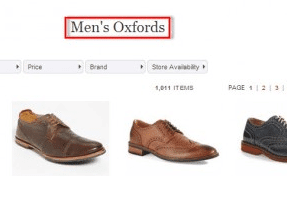
A page’s title shows up on search engine results pages and on social media posts, making it a powerful tool for attracting shoppers to your online store. The title for the home page of WestElm.com, a retailer of home furnishings, is: “Modern Furniture, Home Decor & Home Accessories | west elm.”
A thoughtful, descriptive ecommerce page title can help attract interested shoppers from social media and search engines.
Page title optimization, if you will, is a low-effort, high-value task for ecommerce site owners and managers. The work of crafting good ecommerce page titles is little more intensive than reading this article and thinking about page titles as you write them. The payoff for a well-written ecommerce page title, however, can be significant. If that title strikes a chord with the shopper, she could visit your store. She may even buy something.
Plus, page titles show up in prominent places, such as search engine results pages (as the headline) or on social media posts, where a good title could generate lots of shares.

Page titles show up in prominent places, including search engine results pages.
Page Titles Are for People
Page titles have a specific job. They should describe the page’s content accurately and concisely so interested folks are attracted and people not interested are spared a wasted click.
The more accurate and concise a page title is, the better job it may do in encouraging clicks from shoppers who will actually buy the product the page promotes.
The key takeaway here is that page titles are not just for search engines. They are also for people. So while proper title structure and good word choice may impact how well an ecommerce page ranks on Bing, Google, or the like, the real aim is to convey information to humans so that they can make a better decision about visiting your ecommerce store.
Ecommerce Page Title Structure
Search engine optimizers usually recommend page titles that include one or two descriptive phrases — keyword phrases — and a site’s brand name, separated with pipes or, perhaps, a hyphen.
Keyword phrase one - phrase two | Brand name
As a rule, this format or structure can also be helpful for shoppers trying to decide which link to click from a search engine’s result set.
Here are a few examples of page titles that demonstrate this general structure.
- WestElm.com home page.
Modern Furniture, Home Decor & Home Accessories | west elm
- Category page on Filson.com.
Shirts - Women | Filson
- Product detail page at Suitsupply.com.
Navy V Neck Sw633 | Suitsupply Online Store
Notice that specificity impacts how useful, if you will, the page title is for a given shopper. Consider the Suitsupply example. If the shopper was specifically searching for the Sw633 sweater, this page title will almost certainly invite a click.
There is room for variation within the title pattern. Earlier in this article there is a screen capture from a Google search results page, showing an Etsy result to the search query “kitchen wall art.”
Popular items for kitchen wall art on Etsy
The Etsy page’s title includes two phrases: “popular items for” and “kitchen wall art.” It also includes the site’s name. Effectively, this Etsy page title also follows the general page title structure described here. It is simply a good variation on the theme. In fact, some may say that it even reads better because it resembles a sentence.
We could, alternatively, write it in a fashion similar to the titles shown above.
Popular Items | Kitchen Wall Art | Etsy
This simple structure can be used for just about any page on an ecommerce site, including content pages.
Here is an example from an REI Expert Advice article.
The Ten Essentials for Camping & Hiking - REI Expert Advice
Other Page Title Considerations
Following this basic structure, you should also consider page title length, word choice, and readability.
A page title is not a page description. It is a headline, not the body copy. So it should be relatively short. Suggested character counts range from about 35 to 70 characters.

If the page title is too long, search engines will truncate it and add ellipses.
If the page title is too long, search engines will truncate it and add ellipses on a search results page. Mr. Porter, an online men’s store, is superb at producing content, but it uses very long page titles.
The Great Gin Revival | The Portfolio | The Journal | Issue 266 | 04 May 2016 | MR PORTER
Word choice also plays a role. Use the most common, most-searched words to describe the page content. Try to be as specific as possible. Here is an example of the page title for a product category page on the Cabela’s site. It is relatively general, using both the term “work boots” and the implied “work shoes.”
Men's Work Boots & Shoes : Cabela's
If you click through to a product detail page, the title includes more specific words.
Muck High-Cut Steel-Toe Chore Boots : Cabela's
It is also important not to overuse words. Returning to the example from the Cabela’s category page, it is better to use the word “work” just once rather than repeating it, as in “work boots & work shoes.” Search engines will penalize a site for stuffing keywords in the title.
Finally, remember page titles are meant for people, so make certain that the titles are readable.





